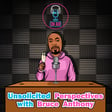
Why We Do What We Do: Karma, Gloria Steinem & the Power of Patterns
Why do we do the things we do? In this episode of "Unsolicited Perspectives," Bruce Anthony takes you on a journey through the patterns of history and the depths of personal emotion. Explore the connections between civil rights, women’s liberation, and LGBTQ+ advocacy, and discover how laughter, tears, and deep thought can lead to powerful self-awareness and social change. Bruce shares personal stories, unpacks generational struggles, and reveals why history keeps repeating itself—offering a fresh perspective on progress, pushback, and the ongoing fight for equality. Whether you’re passionate about social commentary, personal development, or understanding the world through a new lens, this episode is packed with insights, empathy, and the tools you need to navigate today’s complex society. #PersonalGrowth #SocialJustice #AuthenticityMatters #gloriasteinem #karma #civilrightshistory #emotionalintelligence #unsolicitedperspectives
🔔 Hit that subscribe and notification button for weekly content that bridges the past to the future with passion and perspective. Thumbs up if we’re hitting the right notes! Let’s get the conversation rolling—drop a comment and let’s chat about today’s topics.
For the real deal, uncensored and all, swing by our Patreon at patreon.com/unsolicitedperspectives for exclusive episodes and more.
Thank you for tuning into Unsolicited Perspectives with Bruce Anthony. Let's continue the conversation in the comments and remember, stay engaged, stay informed, and always keep an open mind. See you in the next episode!
#podcast #mentalhealth #relationships #currentevents #popculture #fyp #trending #SocialCommentary
Chapters:
00:00 Why Do We Do What We Do? Kickoff & Big Questions 🎙️🤔
00:20 Welcome to Unsolicited Perspectives 🎙️🔥💥
01:07 Inside My Mind: Laughter, Tears & Living Fully Every Day 🧠😂😭
04:10 Seeing Life In Patterns :Looking at Life's Twists & Turns 🔄🔮
08:45 History on Repeat: Civil Rights, Progress & Pushback 🕰️✊
20:39 Don't Blend In: The Magic of Non-Conformity & Standing Out 🚀🌈
25:29 Revolution in Heels: The Women's Liberation Movement Unleashed 👠🔥
33:58 Gloria Steinem: The Fearless Trailblazer Who Changed Everything 👑✊
35:40 Legacy in Action: How Gloria Steinem Broke the Mold 🌟📢
36:52 My Dream Woman: Why Gloria Steinem Inspires Me ❤️🙌
41:54 Toxic Beginnings: The Relationship Story You've Been Waiting For 💔🚩
45:05 When Love Turns Sour: The Downfall of a Toxic Relationship 🕳️😱
48:42 Stuck in the Gray: Surviving a Situationship Saga 😬🔄
55:03 Karma's Lesson: Growth, Pain & Moving Forward 🌱🌀
01:00:37 That's a Wrap! Final Thoughts, Thanks & What's Next 🎬🙏
Follow the Audio Podcast:
Apple Podcast: https://podcasts.apple.com/us/podcast/unsolicited-perspectives/id1653664166?mt=2&ls=1
Spotify: https://open.spotify.com/show/32BCYx7YltZYsW9gTe9dtd
www.unsolictedperspectives.com
Beat Provided By https://freebeats.io
Produced By White Hot
